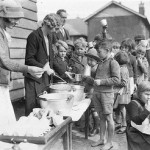As a college athlete, coaches constantly challenged our team, especially in the weight room and at practice. Being “good enough” was not an option. They taught us to push through a last repetition or to finish a certain drill, because that’s what our competition was doing. While we didn’t enjoy it at the time, we later learned that when we were uncomfortable and pushed to the brink, profound results started to happen. This intrigued me as I researched how this could apply in teaching and learning, discovering “Degree 212” by Sam Parker. In his book, Parker explains that at 211 degrees, water is hot. At 212 degrees, water starts to boil. The extra degree creates steam, which can power a train. In college, going the extra degree helped us win tournaments. Since becoming a teacher, going the extra degree has helped my students not just learn concepts, but apply them in the real world. When you feel you have given everything, dig deep and do more. Go the extra degree.
Going the extra degree can look different from teacher to teacher. For me, I utilize the Meaningful PE framework, emphasizing five key components each lesson: Fun, Motor Competence, Social Interaction, Personal Relevance, and Appropriate Challenge. Using this framework allows students to learn meaningful and relevant skills and concepts in a developmentally appropriate setting while experiencing success. In each activity, we always discuss the “why”. While in a tossing and catching lesson, I have students discuss how this activity and improving hand-eye coordination can benefit other activities they already do. Students shared that hand-eye coordination is can help them driving a Go-Kart, improve their hand-writing, and make it easier to build Legos. Now that they see the meaning behind the lesson, they are hooked and engaged. Instead of each student doing the same activity, I differentiate and provide multiple options and levels for students to work towards, which involves fun and appropriate challenge. This also increases “buy-in” because I provided them a voice/choice, which makes them feel valued. I allow them to interact with classmates as well as practicing giving each other feedback. All of these will greatly improve their desire to continue doing these activities in the future, and all will help students move towards physical literacy. This takes extensive planning, but it’s what my students deserve. When lessons are meaningful and relevant, students thrive. It is going the extra degree.
Degree 212 applies to teachers, but also to students. I take pride in creating meaningful lessons and memorable moments students will remember for a long time. To help teach the concept of how students can create memorable moments for others, I show my students motivational videos. Recently, I showed a softball player hitting a ball over the fence for a home run, but tearing her ACL as she rounded the bases. She couldn’t walk, and, by rule, her teammates weren’t allowed to help her. Then, a girl from the other team asked if she could carry the injured player around the bases, helping her touch each base and allowing her to complete her home run. When asked why did it, she replied, “She hit it over the fence. She deserved it. It was the right thing to do.” She went the extra degree. My challenge to my students: What can they do for someone else, that he/she might remember for a lifetime? A 3rd grader recently shared a story in class: “In kindergarten, I was new to this school. I didn’t know anyone. I felt so alone, until a boy came up to me smiling, and said, ‘I’m Adrian. Let’s be friends’.” All the other students were in impressed that he remembered such a small act, which sparked a discussion on how creating these moments doesn’t take a super hero power. It takes a kind heart, and someone who is willing to go the extra degree.
As I reflect on each school day, I am often proud of what my students and I have accomplished. Even when I sense that a lesson is going smoothly, I strive to go give that extra feedback to a student. Instead of asking a basic level one depth of knowledge recall question, I ask a level two or three question. Even when I feel students have grasped a concept, I have them complete an exit ticket to reinforce the concept and provide concrete evidence of understanding. When students are constantly challenged and loved, they rise up and meet the expectations.
Students remember when others go the extra degree for them. When former students come visit me and share their favorite moments in PE, they are always something I could have easily not done. One student said they remember when I looked him in the eye, used his name, and said “I’m so proud of you.” Another student told me it was when I had her write her name on my “Wall of Fame” for going above and beyond for someone else. Another said it was when I invited her and a friend to ride in the carriage with me in a parade. Students might not remember every piece of information you teach them, but they will remember how you made them feel in those moments. This feeling will motivate them to go the extra degree for someone else. Every day, when you think you can’t give any more for your students, give more. When students see you going the extra degree, they will too.










Comments 4
I love the book 212. It reminds me that a small act can make a big difference. While we think sometimes just a little extra is going to kill us or that it’s too much effort, this book helps remind us that truly it is the difference between success and failure. While we know that students and our colleagues are struggling with so much, it can be helpful for them to remember a 1-degree change can make a world of difference.
Author
Thanks for the reply, Austine! It’s tough because teachers are already working so hard. If we can turn it up that extra degree to help our students, it’s a win-win because we feel better about it, and the students will benefit. I’ve learned to work smarter as well, going the extra degree but with help from colleagues (sharing resources and discussing strategies to improve lessons).
Kyle, I really enjoyed reading your post. Yesterday my daughter told me she wants to be a PE teacher when she grows up because she wants to help kids have fun and learn at the same time. I plan on sharing your post with her today so she can see how she doesn’t have to wait until she graduates from college to make a difference. How going the extra degree can help her make PE great right now.
Author
Thanks for sharing, Randi! That makes me happy that your daughter is considering being a PE teacher!